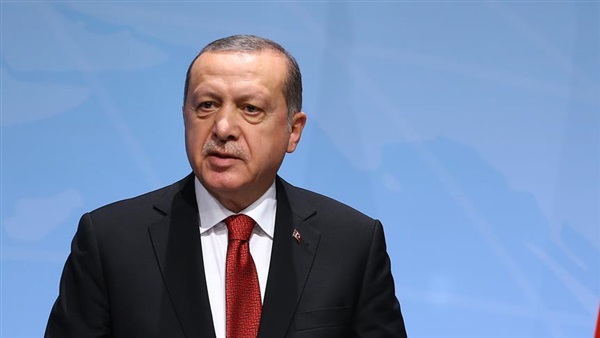Sarah Rashad
The Libyan crisis suddenly rose to the top of Turkish priorities, since the Turkish President, Recep Tayyip Erdogan, for the first time unashamedly disclosed his country’s legitimate right to interfere in Libya, as part of the old Ottoman legacy, saying the end of October 2019: “Today’s Turks are in their geography with respect to ancestral legacy.”
The statements he made at the annual forum of the Turkish government network TNT which was held in Istanbul, and which caused the wrath of the Libyan people, were described by the Libyan politicians as “colonialism” and “insolence.”
Against this background, some media outlets funded by Turkey or supported by Qatar and the terrorist Brotherhood were forced to question the authenticity of the translation of the phrase attributed to the Turkish president, claiming that he did not say what was reported.
Contrary to what those sites claimed, Erdogan continued his policies and interventionist statements in Libya, until Monday, December 9th. He said that his country would not delay sending military forces if asked by the ruling government of Al-Wefaq in Tripoli – according to his claim.
Although Libyan politicians and specialists in Turkish affairs, including the Egyptian scholar Bashir Abdel Fattah, have recognized that Ankara is already present militarily in Libya.
It is seeking to legitimize its presence there, according to his talk to the Reference and continues to repeat the same statement, but in different forms, such as what adviser to Turkish President Recep Tayyip Erdogan, Yassin Aktay, said in statements with the Brotherhood Altnasheh channel, a few days ago, in which he made it clear that Libya was under Turkey’s responsibility, according to the memorandum of understanding signed by the Turkish President and Prime Minister of the Accordance Party, Fayez al-Sarraj, at the end of November 2019.
He added that the Al-Wefaq government is the legitimate representative of the Libyan people, as he claimed, and he was not satisfied with that, as he put his country in the position of government, saying, “We now know who is right and who is false.”
In a new development in the scene, Turkish newspapers and sites funded by Ankara quoted Turkish sources – unnamed – on the end of Turkey’s preparation for a Turkish military base preparing for its establishment in Libya, similar to its counterpart in Qatar.
The opponents of the Turkish project in the region rejected the actions of Ankara, describing Turkey’s intervention as an occupation or a return to the Ottoman Empire.
“Sons of Libya” (a Libyan political grouping supporting the Libyan National Army), said in a statement about Ankara’s interference, rejecting it as an occupier, unlike those affiliated with the Islamic trend, as the son of the isolated Libyan mufti, Suhail Al-Sadiq Al-Gharyani, crossed his account on the social networking site Facebook. He admired Turkey’s actions, recalling the history of Murad Agha, the first Ottoman ruler of Libya.
In light of this, the question becomes what is the size of this importance, and its causes?
The Libyan researcher, Gabriel Al-Ubaidi, discussed this in his article in “Al-Sharq Al-Awsat” Erdogan and the second Ottoman mania, on November 15, 2019, in which he said, “Erdogan is only a person dreaming of expansionist influence in the region, and Libya sees an important paper in this project.”
He pointed out that this will not be successful in light of the Libyan people’s rejection of any new occupation, saying: “Erdogan knows very well that Libya in the era of Turkish colonialism, and is dressed in the mantle of caliphate that Turkey could only subdue what is scarce of coastal cities, due to the great resistance that showed by the Libyan tribes against the authority of the High Gate, and they were constantly rebellious against this authority, so Erdogan speaks of an ancient colonial logic that has eaten forever and drunk.
He continued, “There is no Turkish influence in Libya except the tombs of some defeated Turkish leaders on which the Ottoman Empire built mosques to glorify their affairs, and the people of the country humiliated by praying in mosques built on the tombs of the domes of their leaders.”
In the same context, the interpretations of the Libyan politician were a member of the Sons of Libya group, Abdel Moneim Al-Yassir, who told the Reference that Libya is of economic importance for each of the Turkish Brotherhood project, explaining that it is at the same time ideal conditions to entice them to control it, as it represents weakness governmental institutions and many of their resources are an opportunity to finance their projects.
He pointed out that besides the economic importance, it is one of the colonies of the ancient Ottoman Empire; what justifies pushing the dreamer Erdogan into the legacy of his country to exist.
The Libyan media, Fatima Ghandour, also saw that Libya’s importance to Turkey is due to the latter’s support for the Brotherhood organization, which places Libya at the top of its priorities.
She noted that Turkey is aware that this organization is falling in the region, but it is determined to revive it, blaming Ankara for the responsibility of complicating the scene in the country, as it remains the only country that adheres to the military solution, and is trying in every way not to go to the political solution.
She justified this by initially providing weapons and drones, and then recently announced her readiness to provide the Western Front in Libya (militia) with soldiers.
She stressed that this encouraged the militias to reject any possible political solution.
And she ruled out the possibility of resolving the battles in the Libyan West during the coming days, saying, “I cannot imagine that Turkey would allow the Libyan forces to pass to Tripoli easily.”








































admin in: How the Muslim Brotherhood betrayed Saudi Arabia?
Great article with insight ...
https://www.viagrapascherfr.com/achat-sildenafil-pfizer-tarif/ in: Cross-region cooperation between anti-terrorism agencies needed
Hello there, just became aware of your blog through Google, and found ...